Bahá’í Community News
Regional Conferences of the Five Year Plan
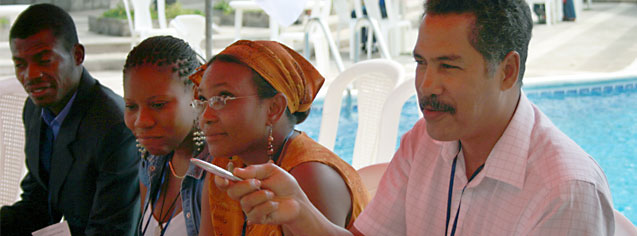 Baha’is from 25 countries in Central America and the Caribbean were invited to the
conference in Managua. More photographs
Baha’is from 25 countries in Central America and the Caribbean were invited to the
conference in Managua. More photographsand video
The Managua Conference
17–18 January 2009
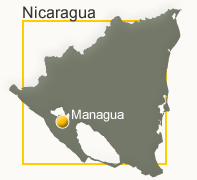
In terms of countries represented, the Managua regional conference is the largest of the 41 gatherings convened by the Universal House of Justice: Baha’is from 25 countries and territories in Central America and the Caribbean were invited to the Nicaraguan capital.
From Spanish-speaking Costa Rica, Cuba, Dominican Republic, El Salvador, Guatemala, Honduras, Nicaragua, Panama, and Puerto Rico; from English-speaking Barbados, Belize, Dominica, Grenada, Jamaica, Leeward Islands, St. Lucia, St. Vincent and the Grenadines, Virgin Islands, Guyana, and Trinidad and Tobago; from French-speaking French Guiana, Guadeloupe, Haiti, and Martinique; and from Dutch-speaking Suriname – 1,500 Baha’is came together to celebrate recent achievements and consult on upcoming activities. Many other languages are also spoken in these countries, and some of those languages were heard during devotions at the conference.
Much of the conference was conducted in Spanish, with earphones provided for people to listen to translation in other languages. The conference was held at a hotel in Managua.
People who had never left their home countries were among those who answered the call of the Universal House of Justice to come celebrate and consult at the regional conference for their area. Many traveled overland for long hours or days, either to reach a departure point for a group bus that would then take them the rest of the way to Managua or to catch a plane, in some cases requiring hopping from country to country to reach Nicaragua.
“A beautiful and unique opportunity to share experiences, to learn, and to obey the institutions.”
Yolanda Rodríguez Villarreal - Panama
Travel documents were a challenge for many, including those who hurriedly had to get passports for children. Friends from Haiti had not yet been granted visas – and knew the documents were in no way a sure thing – but still boarded buses for neighboring Dominican Republic in the hope they would be able to continue their journey to Managua. While they were on the bus, circumstances indeed changed and the visas were given.
One feature of the conference was the significant help of people from the wider community. “Many friends and relatives of Baha’is have taken ownership of the event, even to the point of staffing the conference office,” noted Edwin Sandoval, a member of the National Spiritual Assembly of the Baha’is of Nicaragua.
First day
Because so many places were represented, the opening session included a special welcome with each country or territory introduced as a graphic showed its location.
The two representatives of the Universal House of Justice, Mr. Juan Francisco Mora and Mrs. Rachel Ndegwa, both of whom are members of the International Teaching Centre, were introduced as the conference opened, as were the seven members of the Continental Board of Counselors who were in attendance.
The message of the Universal House of Justice to the friends gathered in the Regional Conference of Managua was read, and it called the participants to focus on the goals of establishing 11 programs of intensive growth by Ridván 2009, and a further 40 such programs by 2011.
Mrs. Ndegwa presented the opening address, describing historical developments over the years and how Baha’i activities have changed according to resources and the needs and understanding at a given time. Many challenges have been met, she said, and now systems and activities are in place that can manage growth, advance community life, and serve the wider society. The need is urgent, she said, for Baha’is to dedicate themselves to such service.
“I have decided to begin a Book 1 study circle with the students of the school where I teach.”
Efrain Gonzalez - El Salvador
This was followed in the afternoon by a presentation by Mr. Mora, who described in detail the institute process and elements of a healthy pattern of growth. He discussed how the decline in the conditions of the world is closely related to increasing receptivity of people to become involved in the core activities of the Baha’i community.
Sharing experiences
Throughout the conference, representatives of different countries were called upon to share experiences from their home communities. Here is a sampling of the comments:
-
Baha’is from Jamaica summed up their work as: thinking in cycles, recognizing the importance of establishing a rhythm of systematic activity, encountering more receptivity than expected, and “learning to learn by doing.”
-
Ludwing Crisol of El Salvador told how he accompanied a friend though a year of studying the first course of the institute sequence. The friend’s children began attending a children’s class, and two months ago the friend decided to join the Baha’i community. He has now joined his second study circle and is sharing with his father and another friend some of what he is learning.
-
Dylan Batres of Costa Rica recounted how he began going to children’s classes at age 7, moved on to participate in the junior youth program, proceeded to study various courses of the training institute, and now himself is an animator of a junior youth group. He said he had challenges and difficulties, but confidence in God and confirmations received from acts of service contribute to the success of the junior youth group he is involved with.
-
Susy Castillo of Guatemala, a mother of four, described in detail how she had gotten involved with study circles, how each of the books she studied opened the door to new acts of service, how she now teaches a children’s class and tutors a study circle, and how her family is now united in attending the Nineteen Day Feast and participating in other activities.
-
Bonifacia Fuente from Panama told how she, her husband and daughter moved to a new area, Santiago, within the last decade to help establish and consolidate Baha’i activities. Study circles were begun, sometimes with help of Baha’is who would visit from other areas. More recently, after seven cycles of organized activity, more than 50 people have joined the Baha’i community and are participating in core activities.
-
Maxima Rodriguez and Rigoberto Escobar from Nedrini in Panama outlined an entire pattern of activity starting nearly a decade ago, where they started core activities, involved youth as much as possible, and integrated songs and handicrafts into their endeavours. In 2006, about 200 people joined the Baha’i community in their area, and now about 50 people join with each new cycle of activity.
Saturday night cultural program
The cultural program on Saturday evening was a joyous celebration of achievements in the region -- beautiful presentations of folkloric dance of Haiti, inspiring and happy songs of Puerto Rico, songs and dances from the Atlantic coast of Honduras and from Panama, and other eye-catching presentations by many friends from throughout the region.
“A ballet troupe, whose members had an average age of about 6 years, drew the analogy of the awakening of the world and the blossoming of flowers,” one attendee wrote afterwards. “Singers performed songs of their own composition. Dancers moved to traditional indigenous beats which, in turn, moved the audience. The stylized ‘Dance of the Religions’ depicted how different creeds can unite in diversity.”
The music continued on Sunday morning, as that session opened with hee-haw music and gospel praise set to Spanish lyrics.
Planning for action
On Sunday, before dividing into more than 40 workshops to discuss plans for specific communities, conference participants heard a presentation by Ana Hilda de Lemus of El Salvador and Ganesh Ramsahai of Trinidad and Tobago, who emphasized the spiritual underpinnings of the enterprise in which Baha’is around the world are engaged.
The workshop consultations were frank in identifying challenges, and each participant was invited to make a short list of concrete services he or she could offer. Afterwards, facilitators tallied up the responses, and a report was presented to the assemblage by Debbie Kirton of Barbados.
Fourteen clusters were identified as areas for establishing intensive programs of growth by April 2009, three more than had been envisioned. Literally hundreds of people stated that they would like to travel to an area other than their own to assist with projects, and more than a thousand people said they could help establish new devotional gatherings, study circles, children’s classes or junior youth groups.
Comments from participants
 David Riaz Hemmat, 18, Dominican Republic: “I hope we can see the rising of people
in the clusters to serve and achieve the goals.”
David Riaz Hemmat, 18, Dominican Republic: “I hope we can see the rising of people
in the clusters to serve and achieve the goals.”
 Sharil Sealy, Barbados: “The conference has brought together lots of questions and
answers….”
Sharil Sealy, Barbados: “The conference has brought together lots of questions and
answers….”
 Yolanda Rodríguez Villarreal, Panama: “A beautiful and unique opportunity to share
experiences, to learn, and to obey the institutions.”
Yolanda Rodríguez Villarreal, Panama: “A beautiful and unique opportunity to share
experiences, to learn, and to obey the institutions.”
 Efrain Gonzalez , El Salvador: “I have decided to begin a Book 1 study circle with
the students of the school where I teach.”
Efrain Gonzalez , El Salvador: “I have decided to begin a Book 1 study circle with
the students of the school where I teach.”
 Riannette Ramdhanie, Trinidad and Tobago: “I found it inspiring. I hope the same spirit
stays with us.”
Riannette Ramdhanie, Trinidad and Tobago: “I found it inspiring. I hope the same spirit
stays with us.”
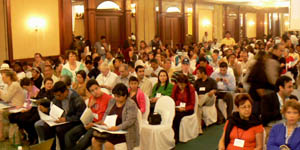
The conference was held at a hotel in the Nicaraguan capital.
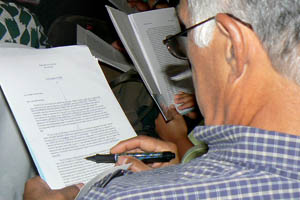
Participants read and studied two messages from the Universal House of Justice, one addressed specifically to the conference.
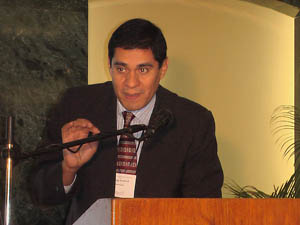
A speaker from the host country of Nicaragua addresses the conference.
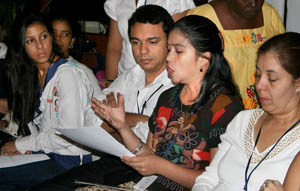
Participating in a workshop are, from left, Dorsa Sabet-Rasekh, Alexis Torrez, Mavis Reyes, and Ruby Sabet-Rasekh, all of Panama.
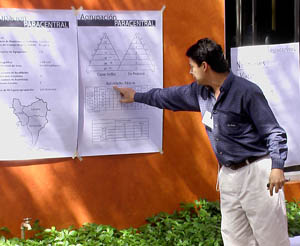
Workshops focused on building participation in core activities at the local level.
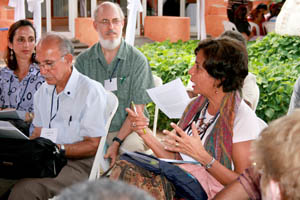
On the first day, people divided into groups to study messages from the Universal House of Justice.
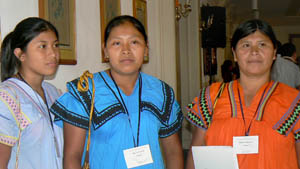
Panama was one of the 25 countries invited to the Managua conference.
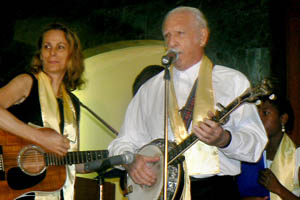
Banjo player Charles Cornell of Honduras just had hip surgery and hadn’t planned on traveling to Managua – until his son attended one of the other conferences and told his parents it was simply not to be missed.
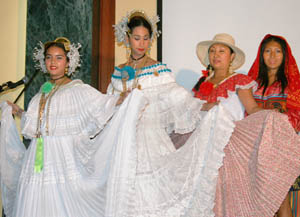
The cultural evening was a time to display traditional music, dance, and costumes.
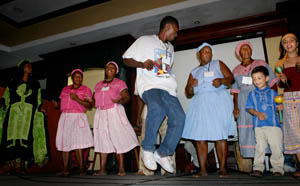
Baha’is from Honduras perform for the friends.
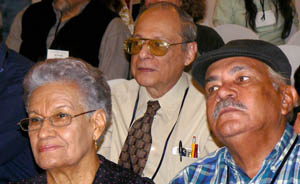
The well-planned conference included both plenary sessions and workshops each day..
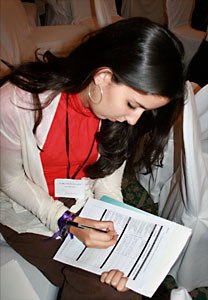
At Sunday workshops, people fill out personal planning forms.
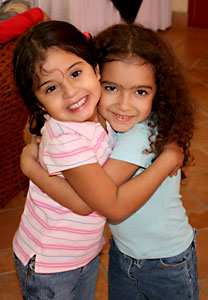
Friends forever ...
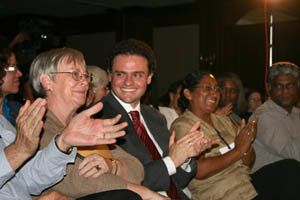
Seven members of the Continental Board of Counselors attended the conference, along with two members of the International Teaching Centre who were the representatives of the Universal House of Justice.
Video: Clips from cultural performances on Saturday evening.













